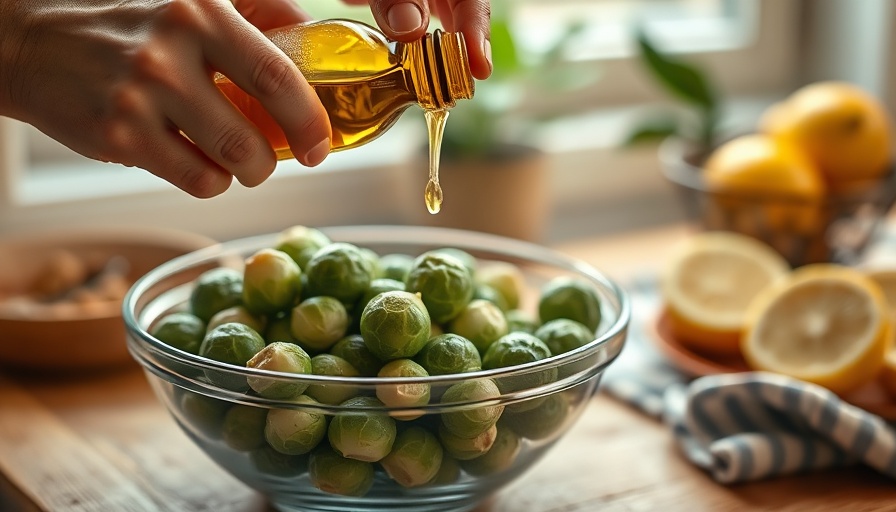
The Hidden Truth Behind Seed Oils: What You Need to Know
As the conversation around health and wellness evolves, the foods we consume have come under increased scrutiny. Among them, seed oils, often vilified by fad diets and wellness influencers, are at the center of a culinary debate. These oils, derived from a variety of seeds like sunflower, canola, and corn, are staples in many kitchens but have raised questions about their health implications. Are seed oils as harmful as some make them out to be? Let’s dive deeper.
Understanding Seed Oils: What Are They?
Seed oils are vegetable oils extracted from seeds. They're prevalent in processed foods, what some refer to as “the hateful eight” — a term that can evoke fear among health-conscious consumers. But these oils can be part of a balanced diet and don't deserve the stigma they often carry.
The Omega-6 Debate: Inflammation or Essential Nutrients?
One of the main concerns surrounding seed oils involves omega-6 fatty acids, particularly linoleic acid. Critics argue that excessive linoleic acid can lead to chronic inflammation due to its conversion to arachidonic acid. However, recent studies indicate otherwise. A 2017 meta-analysis demonstrated that increasing dietary linoleic acid doesn't significantly raise inflammatory markers in the body. Interestingly, arachidonic acid is also a precursor for anti-inflammatory compounds, indicating a complex relationship between omega-6 fats and inflammation.
A Closer Look at the Nutritional Benefits
Besides omega-6, seed oils are rich in vitamin E and other antioxidants, which play crucial roles in promoting cardiovascular health and improving nutrient absorption. The American Heart Association urges a diet inclusive of these fatty acids, highlighting that they can effectively reduce cardiovascular disease risk when consumed in moderation.
How Are Seed Oils Made? The Extraction Process
The production process of seed oils often raises eyebrows. It typically involves crushing seeds and using solvents like hexane to extract oil. Critics argue that such chemical extraction leaves harmful residues. While it’s true that hexane is hazardous in gas form, its application in liquid states and subsequent evaporation during the refining process minimizes potential health risks. Current regulations in Canada ensure that hexane levels remain safe.
What's the Environmental Impact of Seed Oils?
Seed oil production is often seen as environmentally taxing, primarily due to the agricultural practices involved. From pesticide use to monoculture farming, the impact can be significant. However, opting for sustainably sourced and organic seed oils can help mitigate these environmental concerns. As eco-conscious consumers, it’s vital to support brands that prioritize sustainable practices.
Counterarguments: Why It's Important to Take a Balanced Approach
Despite the controversies surrounding seed oils, it's imperative to consider all dietary fats within context. Moderation is key. Healthy seeds like flax and chia, often lauded for their health benefits, provide omega-3 fatty acids that balance the omega-6 intake from seed oils. When consumed mindfully within a varied diet, seed oils can contribute positively to overall nutrition.
Making Informed Choices: How to Select the Right Oils for Your Kitchen
When navigating the world of oils, the key is to remain educated. Choose high-quality oils that are less processed and derive from whole seeds. Organic and cold-pressed options ensure minimal exposure to chemicals and retain beneficial nutrients. Don’t shy away from trying different oils; for instance, olive oil is fantastic for dressings, while avocado oil can work wonders when cooking at higher temperatures.
Conclusion: A Road to Healthy Eating
Understanding seed oils is essential in the journey to a healthier lifestyle. While moderation and mindful consumption matter, it’s equally important to ensure a broader perspective that includes various nutritional insights. Embrace diversity in your diet and seek knowledge about the food you're consuming. The truth about seed oils reflects a more balanced narrative than the sensationalized stories tell. So, the next time you reach for oil in your kitchen, remember, the story is more complex than just good or bad.
Call to Action: Ready to take charge of your health? Incorporate diverse fats into your diet while understanding their impacts. Share this article with friends and family to promote a more informed discussion about what’s really on our plates!
 Add Row
Add Row  Add
Add 



 Add Row
Add Row  Add
Add 
Write A Comment